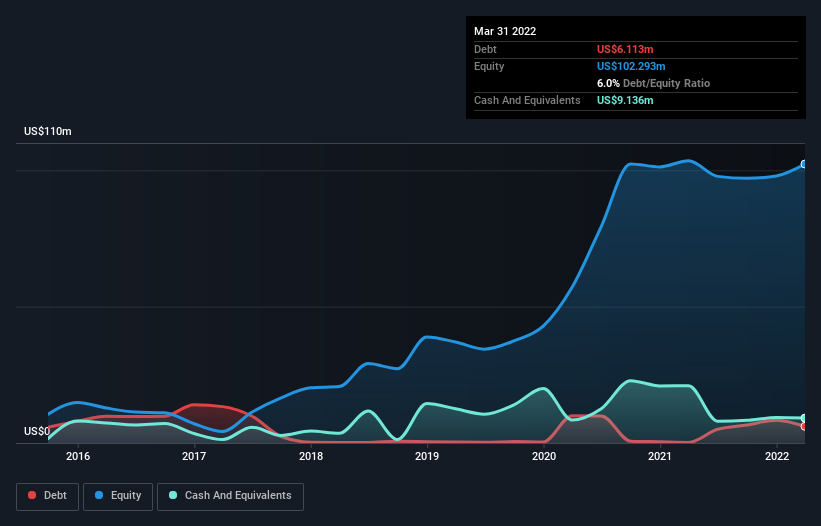- United States
- /
- Healthtech
- /
- NasdaqGM:CCLD
These 4 Measures Indicate That CareCloud (NASDAQ:MTBC) Is Using Debt Safely
The external fund manager backed by Berkshire Hathaway's Charlie Munger, Li Lu, makes no bones about it when he says 'The biggest investment risk is not the volatility of prices, but whether you will suffer a permanent loss of capital.' So it seems the smart money knows that debt - which is usually involved in bankruptcies - is a very important factor, when you assess how risky a company is. Importantly, CareCloud, Inc. (NASDAQ:MTBC) does carry debt. But the more important question is: how much risk is that debt creating?
Why Does Debt Bring Risk?
Generally speaking, debt only becomes a real problem when a company can't easily pay it off, either by raising capital or with its own cash flow. Part and parcel of capitalism is the process of 'creative destruction' where failed businesses are mercilessly liquidated by their bankers. However, a more usual (but still expensive) situation is where a company must dilute shareholders at a cheap share price simply to get debt under control. Of course, the upside of debt is that it often represents cheap capital, especially when it replaces dilution in a company with the ability to reinvest at high rates of return. The first step when considering a company's debt levels is to consider its cash and debt together.
Check out our latest analysis for CareCloud
How Much Debt Does CareCloud Carry?
You can click the graphic below for the historical numbers, but it shows that as of March 2022 CareCloud had US$6.11m of debt, an increase on US$202.0k, over one year. However, it does have US$9.14m in cash offsetting this, leading to net cash of US$3.02m.

How Strong Is CareCloud's Balance Sheet?
According to the last reported balance sheet, CareCloud had liabilities of US$28.1m due within 12 months, and liabilities of US$10.8m due beyond 12 months. On the other hand, it had cash of US$9.14m and US$23.1m worth of receivables due within a year. So its liabilities outweigh the sum of its cash and (near-term) receivables by US$6.65m.
Since publicly traded CareCloud shares are worth a total of US$61.9m, it seems unlikely that this level of liabilities would be a major threat. But there are sufficient liabilities that we would certainly recommend shareholders continue to monitor the balance sheet, going forward. Despite its noteworthy liabilities, CareCloud boasts net cash, so it's fair to say it does not have a heavy debt load!
It was also good to see that despite losing money on the EBIT line last year, CareCloud turned things around in the last 12 months, delivering and EBIT of US$4.8m. The balance sheet is clearly the area to focus on when you are analysing debt. But it is future earnings, more than anything, that will determine CareCloud's ability to maintain a healthy balance sheet going forward. So if you want to see what the professionals think, you might find this free report on analyst profit forecasts to be interesting.
But our final consideration is also important, because a company cannot pay debt with paper profits; it needs cold hard cash. CareCloud may have net cash on the balance sheet, but it is still interesting to look at how well the business converts its earnings before interest and tax (EBIT) to free cash flow, because that will influence both its need for, and its capacity to manage debt. Over the last year, CareCloud recorded free cash flow worth a fulsome 91% of its EBIT, which is stronger than we'd usually expect. That positions it well to pay down debt if desirable to do so.
Summing Up
While CareCloud does have more liabilities than liquid assets, it also has net cash of US$3.02m. And it impressed us with free cash flow of US$4.3m, being 91% of its EBIT. So we don't think CareCloud's use of debt is risky. When analysing debt levels, the balance sheet is the obvious place to start. But ultimately, every company can contain risks that exist outside of the balance sheet. For example, we've discovered 3 warning signs for CareCloud that you should be aware of before investing here.
If, after all that, you're more interested in a fast growing company with a rock-solid balance sheet, then check out our list of net cash growth stocks without delay.
New: AI Stock Screener & Alerts
Our new AI Stock Screener scans the market every day to uncover opportunities.
• Dividend Powerhouses (3%+ Yield)
• Undervalued Small Caps with Insider Buying
• High growth Tech and AI Companies
Or build your own from over 50 metrics.
Have feedback on this article? Concerned about the content? Get in touch with us directly. Alternatively, email editorial-team (at) simplywallst.com.
This article by Simply Wall St is general in nature. We provide commentary based on historical data and analyst forecasts only using an unbiased methodology and our articles are not intended to be financial advice. It does not constitute a recommendation to buy or sell any stock, and does not take account of your objectives, or your financial situation. We aim to bring you long-term focused analysis driven by fundamental data. Note that our analysis may not factor in the latest price-sensitive company announcements or qualitative material. Simply Wall St has no position in any stocks mentioned.
About NasdaqGM:CCLD
CareCloud
A healthcare information technology (IT) company, provides technology-enabled business solutions, Software-as-a-Service offerings, and related business services to healthcare providers and hospitals primarily in the United States.
Flawless balance sheet and good value.
Similar Companies
Market Insights
Community Narratives





